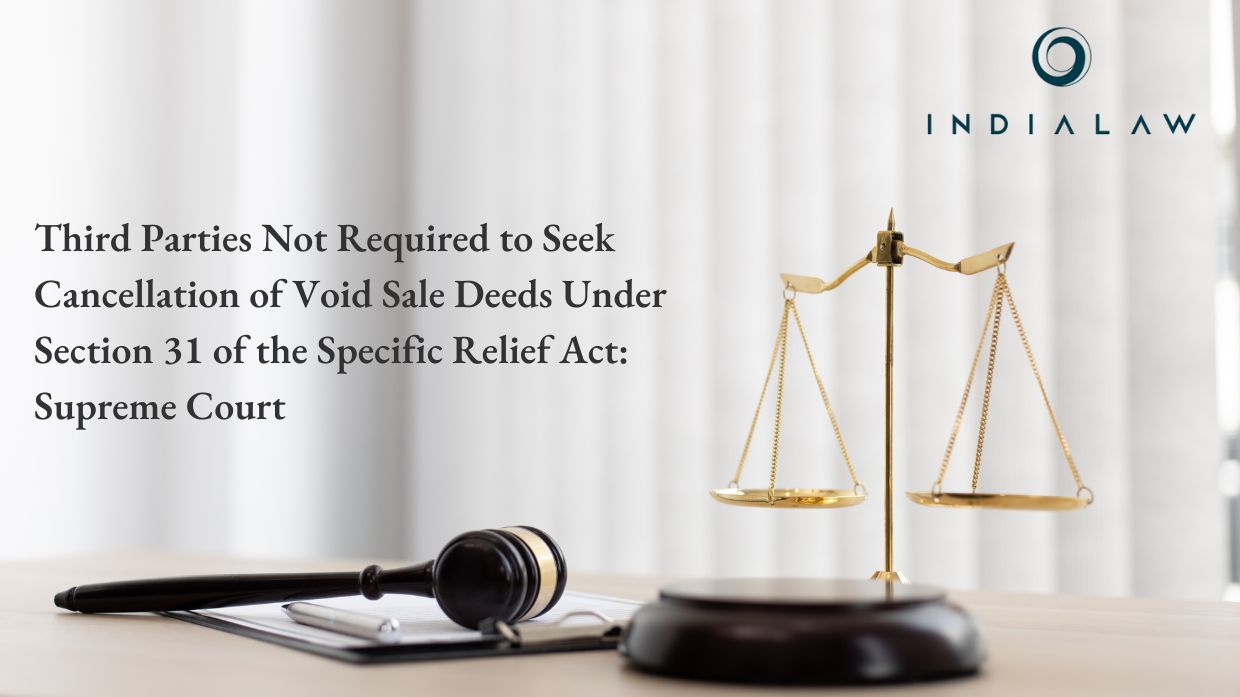Third Parties Not Required to Seek Cancellation of Void Sale Deeds Under Section 31 of the Specific Relief Act: Supreme Court

In a recent landmark decision, the Hon’ble Supreme Court[1] (“SC”) held that third parties affected by invalid sale deeds are not obligated to formally seek their cancellation.
[1] Sk. Golam Lalchand v. Nandu Lal Shaw & Ors., Civil Appeal No. 4177 of 2024.
Facts of the Case
The dispute arose from a Title Suit filed by one Nandu Lal Shaw, challenging the validity of a sale deed executed by one Brij Mohan, who was the son of late Sita Ram. Nandu Lal Shaw claimed that Brij Mohan did not have the authority to sell the entire property, as it was jointly owned with his family, including Nandu Lal’s relatives.
The property was originally purchased in 1959 by two brothers, late Salik Ram and late Sita Ram, each having an equal share. Nandu Lal argued that Salik Ram never transferred his share to Sita Ram, making the property remain jointly owned. He contended that Brij Mohan’s sale of the entire property to S.K. Golam Lalchand, a tenant, was invalid as it was not partitioned or properly documented.
Despite the Ld. Trial Court’s initial dismissal of the suit, the appellate courts overturned the decision, emphasizing that the property had not been properly partitioned and Brij Mohan could not transfer it entirely.
Analysis
The SC decided the case in hand based on the following key points:
- Joint Ownership: The SC held that the property remained undivided between late Salik Ram and late Sita Ram. No evidence was produced to prove that Salik Ram had legally transferred his share to Sita Ram or that a valid family settlement had occurred.
- Authority to Transfer: Since Brij Mohan could not prove exclusive ownership or proper partition, his sale of the entire property was deemed invalid. The SC emphasized that a co-owner cannot transfer an entire property without the agreement or involvement of other co-owners.
The SC noted that while the sale deed was invalid regarding the entire property, it would be correct to consider that the share of the property concerning Brij Mohan would be a valid sale provided if he had legitimate ownership. Further, the SC ruled that third parties adversely affected by a sale deed are not required to file for its cancellation. The court emphasized that Section 31 of the Specific Relief Act[2] uses the term ‘may’ rather than ‘shall,’ allowing for flexibility in these situations. The SC clarified that Section 31’s use of ‘may’ does not mandate such requests in every case, especially when the individual is not a direct party to the deed.
Conclusion:
In the authors’ opinion, the Supreme Court’s ruling offers clarity when dealing with matters concerning property disputes involving invalid sale deeds. The ruling reiterated that third parties adversely affected by such deeds are not required to seek their cancellation. This decision highlights the flexibility embedded in Section 31 of the Specific Relief Act. The Court pointed out that Section 31 of the Specific Relief Act uses the word ‘may,’ not ‘shall,’ meaning it’s not always necessary to cancel a deed. The ruling also emphasizes that proper ownership and documentation are crucial.
[1] Sk. Golam Lalchand v. Nandu Lal Shaw & Ors., Civil Appeal No. 4177 of 2024.
[2] Section 31 – When cancellation may be ordered.
(1) Any person against whom a written instrument is void or voidable, and who has reasonable apprehension that such instrument, if left outstanding may cause him serious injury, may sue to have it adjudged void or voidable; and the court may, in its discretion, so adjudge it and order it to be delivered up and canceled;
(2) If the instrument has been registered under the Indian Registration Act, 1908 (16 of 1908), the court shall also send a copy of its decree to the officer in whose office the instrument has been so registered; and such officer shall note on the copy of the instrument contained in his books the fact of its cancellation.
By entering the email address you agree to our Privacy Policy.



